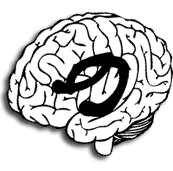Study: Brain's Hippocampus Shrinks Due to Stress in Children
 From VOA [listen to the report]:
From VOA [listen to the report]:
Psychiatrists know post-traumatic stress disorder, or PTSD, develops in people exposed to chronic stress. Researchers have studied the brains of adults with the psychological disorder and found a region of their brains called the hippocampus to be smaller than in people without PTSD. The hippocampus is a part of the brain associated with the storage and retrieval of memories.
Dr. Victor Carrion, a psychiatrist at California's Stanford University wondered if the same phenomenon occurred in children, and if exposure to severe stress caused their hippocampi to shrink.
Click on 'Article Link' below tags for much more...
Continuing:
Carrion and his colleagues evaluated 15 pre-adolescent children with symptoms of PTSD, including nightmares and uncontrollable flashbacks, extreme agitation and emotional numbness. They assessed the children's behavior at the beginning of the study and again after 12 to 18 months. They also measured blood levels of the stress hormone cortisol and took images of their brains.
They found that kids with more severe PTSD symptoms had more cortisol in their blood and their hippocampi decreased in volume. "What that means is that the higher your symptoms of PTSD, or the higher your level of cortisol, the higher your chances of having a decrease in the size of this structure," Carrion notes, adding that this was the first time researchers have really seen that connection, indicating how cortisol might be related to the hippocampus.
Carrion says he was surprised at how quickly the changes occurred, even though the children were not experiencing trauma during the time of the study. "This is a trauma that they experienced in the past," he explains, "so we're seeing the consequences of the trauma having an effect on the individual, not only the trauma."
Carrion says knowing about the physiologic changes in the hippocampus might help researchers understand why PTSD becomes a chronic condition and develop better treatments to help children. His study appears in the journal Pediatrics.
While the study was done on children, it most likely has bearing on adults as well. It also may the first step to clearing up one debate in the field. Jake Young at Pure Pedantry explains:
There was a debate in the post-traumatic stress disorder (PTSD) for some time about whether the shrinkage observed in the hippocampus -- a structure involved in learning and memory -- was the result of the stress or was a vulnerability factor for the disease.
We know that high levels of cortisol -- a stress hormone -- can kill neurons. So you could argue that the stress and stress hormones that cause PTSD could also result in the reduction in hippocampal volume. This is the so-called neurotoxicity hypothesis.
On the other hand, individuals who get PTSD could have some underlying genetic or structural susceptibility, one characteristic of which could be an already smaller hippocampus. This is the so-called vulnerability hypothesis.
He goes on to say that the Stanford study "adds credibility to the neurotoxicity hypothesis."

Related Posts
- Study: Asthma-PTSD Link Found
- Texas A&M Researchers Set to Study Biological Components of PTSD
- Charlie Rose Explores Fear, Stress and the Brain
- Study: Specific Brain Chemical Appears to Influence Individual Resiliency and Stress Reaction
- Study: 1-in-5 Iraq Vets Diagnosed with Migraines, Suffer Higher Rates of Depression and PTSD
- Study: Drug May Ease Combat PTSD Nightmare Incidence
- Study: Military Kids Have Higher Blood Pressure, Heart Rates, and Stress Levels
- Study: 'Prolonged Exposure' Therapy Superior Treatment for Female PTSD
- A Sample of the Latest PTSD Study Results
- Neuroscience Study: Prefrontal Cortex Hyperactivity in Brain Associated with Learned Fear, PTSD
- Study: Common PTSD Med Guanfacine As Effective As Placebo
- Study: Vets' View on Combat Injury Effects PTSD
- Study: Higher Memory, Attention Lapses for OIF Vets


